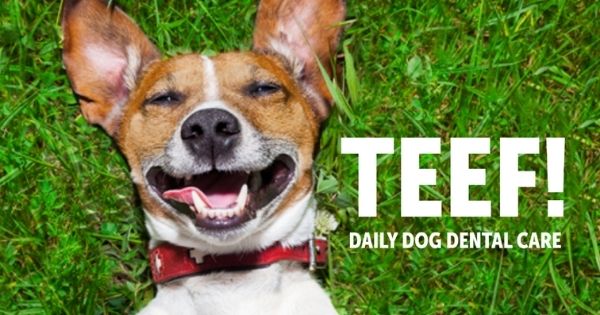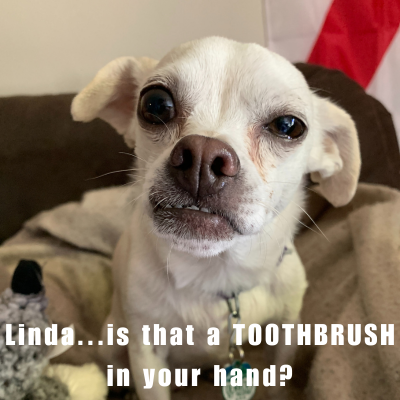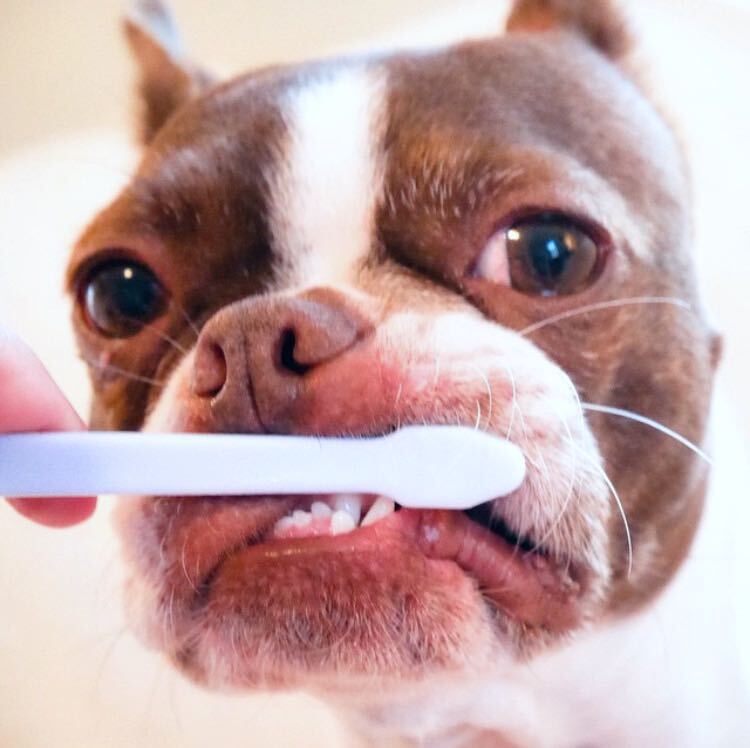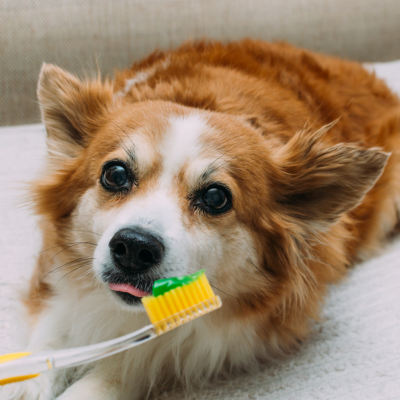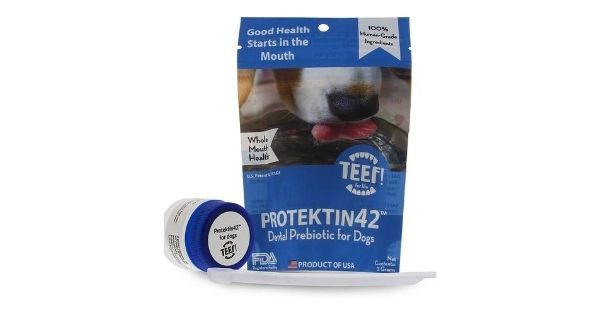The article below is written by Dr. Emily Stein the CEO and inventor of TEEF! by Primal Health; TEEF uses patented science that selectively favors health-promoting bacteria to flourish in your pet’s mouth while disrupting dangerous bacteria.
PURCHASE TEEF! DRINKABLE DENTAL HEALTH TODAY
PetHub Basic+ users can check out our Perk Deal from TEEF! for special discounts
As a microbiologist with a background in immunology, dental disease can be a scary reality. I witnessed both my grandmother and senior rescue dog suffer from severe systemic health issues directly related to their poor dental condition.
Fortunately, I understood that the ultimate driver of those health issues stemmed from an imbalance in the bad vs. good bacteria that creates an unhealthy environment in the mouth. Now, I'm here to tell you about dog dental care and how you can help to maintain your furry friend's dental health.
The problem leading to dental disease in pets?
Too many harmful bacteria behaving badly below the gum line are the cause of dental disease in pets which can affect a dog's breath, cause advanced periodontal disease and tooth loss.
Persistence and overgrowth of dental disease-causing bacteria leads to gum inflammation. That inflammation quickly causes tissue destruction, and bleeding, which gives bacteria full access to the rest of the body where they can set up shop in organs, joints and cause severe health issues and disease over time.
A pup's teeth and their overall health can contribute to the wellbeing or health issues throughout their body.
Gum disease is linked to:
- Kidney disease
- Diabetes
- Heart disease
- Arthritis
- And countless other health issues

Image by Bryn Souza
The solution to maintaining a dog's dental health?
You can help your pet reduce their chances of getting dental disease by promoting higher levels of beneficial bacteria which can result in a naturally healthier mouth - less tooth plaque, less inflammation, and less breath stink.
Healthy dental hygiene habits are imperative for maintaining balance in the mouth, resulting in better health and longevity. In addition to annual veterinary dental cleanings, there are several “at home” regimens that can encourage microbial diversity for dental health in your pets.
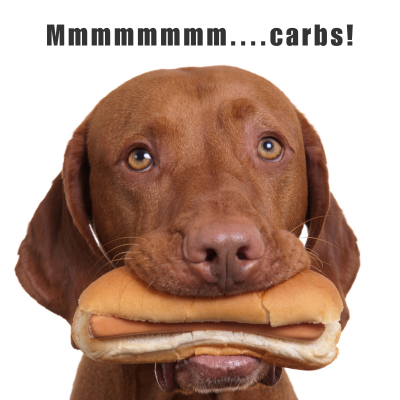
Low carbohydrate diet
Raw food for dogs and cats is increasing in popularity, and it makes sense for pets in many ways. But there are still risks with raw food, including a higher burden of dangerous bacteria living on raw foods (like Salmonella, E. coli, etc.).
There’s also a lack of appreciation for the fact that there are still carbohydrates in a raw diet – not processed, which is great, but carbs feed the bacteria that are most destructive in the mouth and gums of our dogs and cats which can lead to dental issues.
Here are some tips on what to include in your pets' diet:
- Focus on green leafy vegetables for carbohydrates/fibers (and limit potatoes, chickpeas, and yams)
- Provide organs and muscle from animals that have not been exposed to antibiotics or pesticides
- Be aware that bone marrow contains simple sugars so be mindful to limit bones to only a few times a week, at most
- Stay away from sugary fruits such as apple, pear, bananas and strawberries
-
Blueberries, raspberries and blackberries are great to include as treats or food toppers
-
Mechanical removal to keep a dog's teeth clean
Regular brushing of a dog's teeth is the best and safest approach to keep a dog's teeth clean and can maintain a dog's oral health. Physical removal of plaque and tartar from the tooth is always a good thing and it can be done with the help of a pet toothbrush or finger brush attachment, or even gauze wrapped around a finger.
Image by Bryn Souza
Finger polishing a pet's teeth using gauze or material will wipe off the dental biofilm from a dog’s teeth, however, sticking foreign objects in a pet’s mouth isn’t always well-received by the pet. As with all things pet related, positive reinforcement training can help a dog or cat associate the act of teeth cleaning with a reward like treats or praise.
Start slow, get your pet accustomed to the tools you're using (toothbrush, dog toothpaste, or fingertip attachment) and work your way up to regular dental cleanings at home, ideally to where you're cleaning your pet's teeth daily.
If your pet won't allow you to brush their teeth or wipe them with gauze, that’s where chews can be a last resort (these chews are recommended by the Veterinary Oral Health Council). It's important to monitor the frequency of use since many dog dental chews are very high in calories and carbohydrates, plus you want to ensure there’s no choking hazard.
Supplements and additives
Dental supplements and additives can be effective but tricky in that they can often be laced with harsh chemicals and detergents (triclosan, cetylpyridinium chloride, chlorine dioxide, sodium tripolyphosphate) that DECREASE diversity of the microbiome.
Why?
These chemicals do not discriminate between good vs bad and kill beneficial bacteria in the pet's mouth and gut, which is essential for optimal dental and overall health. Also, it’s important to select these dental products according to ingredients - if you can’t pronounce them, don’t use it.
Physical signs of poor pet dental health
There’s plenty of conversations around gut health and its importance in overall health but oral health is often ignored or overlooked as a catalyst that dictates it all. The very first sign of dental disease is bad breath. Other signs to look out for include:
- Red or inflamed gum tissue (sometimes bleeding) and mouth swelling
- Discolored plaque and tartar buildup on a dog's teeth
- Receding gums that expose the root of the tooth
Swollen and bleeding gums in a dog's mouth can be reversed or healed, to a certain degree, with a regular daily dental hygiene regimen. This is why I encourage you to brush your dog's teeth. I also encourage yearly dental exam and professional cleanings under general anesthesia that can remove plaque buildup and tartar while also ensuring a veterinarian is conducting a tooth by tooth examination of your dog or cat.
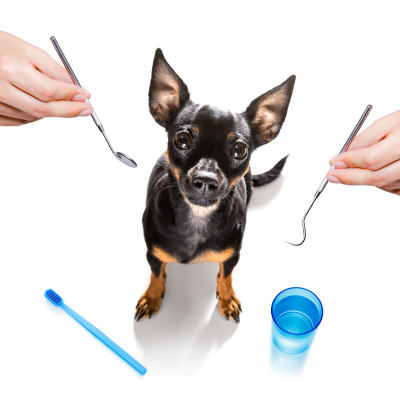 Damage to the periodontal ligament (which holds a tooth in place, at the root) cannot be reversed and will require extraction. This is not only expensive but can also affect longevity.
Damage to the periodontal ligament (which holds a tooth in place, at the root) cannot be reversed and will require extraction. This is not only expensive but can also affect longevity.
Dental disease can lead to health problems that could result in a loss of 1/3 of your pet's lifespan. It's much more than stinky dog breath and oral hygiene is a serious thing to be aware of if you want to have a happy and healthy pet, that also happens to have fresh breath!
Re-establishing bacterial balance in your pet's mouth, like when your pet was young, is the key to a truly healthy mouth and body. A combination of the tips outlined above creates the optimum environment for the health of your dog (and you, too!).
Take the next step to dental health with TEEF!
TEEF is different from other dental care products on the market. Rather than killing as many bacteria as possible, TEEF empowers good bacteria plus out-competes the bad bacteria for a naturally-balanced, healthier mouth.
PURCHASE TEEF! DRINKABLE DENTAL HEALTH TODAY
*** PetHub users can check out our Premium Perks Deals from TEEF! for special discounts ***
About Dr. Stein:
Dr. Stein holds a Ph.D. in Microbiology from the University of California at Berkeley where she studied signaling pathways involved in stress response and community development in bacteria and received her B.S. in Microbiology and Immunology at the University of Iowa where she studied the interaction between M. tuberculosis and innate immune cells.
She founded Primal Health, LLC to focus on improving the quality of life and longevity of both humans and animals by producing innovative, consumable and safe dental hygiene products. Their patented prebiotic technology centers on re-engineering disease-causing bacterial biofilms into those that are health-promoting.




